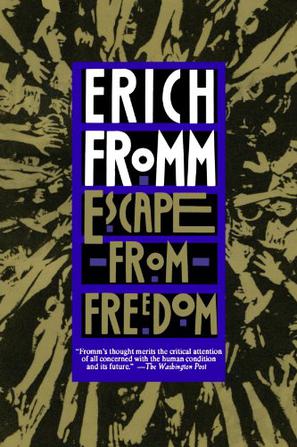欢迎来到相识电子书!
标签:社會哲學
-
Escape from Freedom
If humanity cannot live with the dangers and responsibilities inherent in freedom, it will probably turn to authoritarianism. This is the central idea of Escape from Freedom, a landmark work by one of the most distinguished thinkers of our time, and a book that is as timely now as when first published in 1941. Few books have thrown such light upon the forces that shape modern society or penetrated so deeply into the causes of authoritarian systems. If the rise of democracy set some people free, at the same time it gave birth to a society in which the individual feels alienated and dehumanized. Using the insights of psychoanalysis as probing agents, Fromm’s work analyzes the illness of contemporary civilization as witnessed by its willingness to submit to totalitarian rule. -
中国的宗教
在《中国的宗教:儒教与道教》一书中,韦伯长篇大论地分析了中国的国家、法律、城市、行会、士人阶层、正统礼教、异端信仰等等,无非是想借此构筑出:中国人想的是什么(例如:传统主义的价值取向、巫术性的世界图像)、做出的是什么(例如:家产制政体、家族社会、家族经济组合),以及所想与所做的之间的辩证关系。其中,主导此一辩证关系之进行的儒教官绅知识阶层,于韦伯所构筑的传统中国历史舞台上,展现出使得中国整体文明进展之与西方大相径庭的坚实活力。 由于所要解决的问题不同,韦伯的研究虽然仍属历史范畴,其途径却与一般史学者惯常采用的稍有出入。简言之,韦伯较注重的是贯穿于整个文明中一些较为不变的现象。因此,尽管王朝屡屡更迭,官制也代代有差,在韦伯看来,自秦始皇统一中国、建立家产制支配后,中国基本上就是个家产官僚制国家,具有家产官僚制的一般特性(而置诸如君权相权消长等问题不谈)。 -
Madness and Civilization
This was Michel Foucault's first major book, written while he was the Director of the Maison de France in Sweden. It examines ideas, practices, institutions, art and literature relating to madness in Western history. Foucault begins his history in the Middle Ages, noting the social and physical exclusion of lepers. He argues that with the gradual disappearance of leprosy, madness came to occupy this excluded position. The ship of fools in the 15th century is a literary version of one such exclusionary practice, the practice of sending mad people away in ships. However, during the Renaissance, madness was regarded as an all-abundant phenomena because humans could not come close to the Reason of God. As Cervantes' Don Quixote, all humans are ridiculous weak to desires and dissimulation. Therefore, the insane, understood as one who has come too close to God's Reason, was accepted in the middle of society. It is not before the 17th century, in a movement which Foucault famously describes as the Great Confinement, that "unreasonable" members of the population systematically were locked away and institutionalised. In the 18th century, madness came to be seen as the obverse of Reason, that is, as having lost what made them human and become animal-like and therefore treated as such. It is not before 19th century that madness became mental illness that should be cured, e.g. Freud. Later it was demonstrated that the large increase in confinement did not happen in 17th but in the 19th century, somewhat undermining his argument. Foucault also argues that madness during Renaissance had the power to signify the limits of social order and to point to a deeper truth. This was silenced by the Reason of Enlightenment. He also examines the rise of modern scientific and "humanitarian" treatments of the insane, notably at the hands of Philippe Pinel and Samuel Tuke. He claims that these modern treatments were in fact no less controlling than previous methods. Tuke's country retreat for the mad consisted of punishing the madmen until they gave up their commitment to madness. Similarly, Pinel's treatment of the mad amounted to an extended aversion therapy, including such treatments as freezing showers and use of a straitjacket. In Foucault's view, this treatment amounted to repeated brutality until the pattern of judgment and punishment was internalized by the patient.
热门标签
下载排行榜
- 1 梦的解析:最佳译本
- 2 李鸿章全传
- 3 淡定的智慧
- 4 心理操控术
- 5 哈佛口才课
- 6 俗世奇人
- 7 日瓦戈医生
- 8 笑死你的逻辑学
- 9 历史老师没教过的历史
- 10 1分钟和陌生人成为朋友



